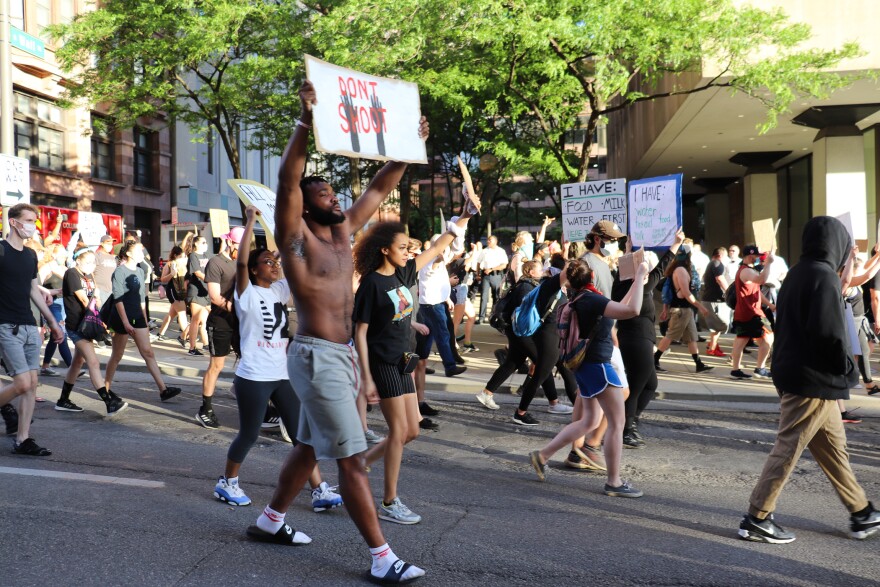Public health experts worried that COVID-19 would continue to spread even as states reopen. Those concerns have been compounded recently, as large crowds gather to protest police brutality and the killings of black Americans.
Columbus Public Health says a person attended protests in downtown Columbus while showing symptoms of COVID-19, and later tested positive for the coronavirus.
"I must point out that you are now looking at a public health problem within another public health problem," says Ogbonnaya Omenka, a professor of public health and health disparities at Butler University. "Violence in itself is and should be classified across the board as a public health problem in our nation. Now, these protests as a result of police action are happening within the COVID-19 crisis."
Omenka says that these gatherings, which have drawn hundreds or even thousands of people into public spaces, complicate efforts to track the spread of the virus.
"In an ideal world, the public health response or approach to mitigating the transmission of the virus during public gatherings, including these protests, would be to regularly test as many of the participants in these protests, as many of them as possible," he says. "These are not all friends or people who live in the same neighborhood. So I may not know who I stood next to or who I even hugged or shook hands with or whatever that people do in terms of social solidarity."
Some protesters have worn masks and try to use hand sanitizer. But even those safety precautions may not protect crowds where people are chanting and yelling, police use chemical agents like tear gas, and arrested protesters are placed into crowded vehicles or cars.
"You would expect locking people up tear gassing, coughing, you know, and all of these things that we are seeing yes, normally they should add to the spike in the number of infections and cases," Omenka says.
Existing health disparities add to the concern for protesters. While African Americans make up just 14% of Ohio's population, they account for 25% of the state's confirmed coronavirus cases, 31% of hospitalizations and 17% of deaths.
"We have a scenario where a lot of people from the black community are distrustful of anything public health, of anything government. So, never mind that there are not enough resources within these communities, but even when you try to implement anything, even lifesaving interventions, members of black communities may not be open to these interventions because of the lack of trust," Omenka says.
"You're talking about asking people their whereabouts, to give information about others that they know," he continues. "But we know over the years how that same process has been used, or that the members of the black community feel like when they reveal information about themselves, that leads to damage being done to them."
People who attend protests are recommended to move in smaller groups, if possible, to reduce the risk of spreading the virus. Omenka also says that wearing masks, washing hands, wearing eye protection and staying hydration remain important.
However, Omenka says law enforcement have as much or more responsibility to consider the public health risks of their actions.
"I don't think it's effective to shift the burden of safety to the participants in the protests," he says. "Police also, or any authorities involved in responding to the protests, should also be educated or exposed to the information necessary for their participation. For example, police exercising restraint when there is no provocation. I know the authorities are there to maintain peace and order. But it is important also that we factor in the public health aspect into all of this."
This story was produced by Side Effects Public Media, a news collaborative covering public health.






